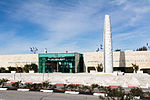Knesset Menorah

The Knesset Menorah (Hebrew: מנורת הכנסת Menorat HaKnesset) is a bronze Menorah 4.30 meters high, 3.5 meters wide, and weighs 4 tons. It is located at the edge of Wohl Rose Park (Hebrew Gan Havradim, "Rose Garden") opposite the Knesset. It was designed by Benno Elkan (1877–1960), a Jewish sculptor who escaped from his native Germany to Britain. It was presented to the Knesset as a gift from the Parliament of the United Kingdom on April 15, 1956 in honour of the eighth anniversary of Israeli independence. The Knesset Menorah was modelled after the golden candelabrum that stood in the Temple in Jerusalem. A series of bronze reliefs on the Menorah depict the struggles to survive of the Jewish people, depicting formative events, images and concepts from the Hebrew Bible and Jewish history. The engravings on the six branches of the Menorah portray episodes since the Jewish exile from the Land of Israel. Those on the central branch portray the fate of the Jews from the biblical return to the Land to the establishment of the modern State of Israel. It has been described as a visual "textbook" of Jewish history.
Excerpt from the Wikipedia article Knesset Menorah (License: CC BY-SA 3.0, Authors, Images).Knesset Menorah
Rothschild, Jerusalem Kiryat HaMemshalah
Geographical coordinates (GPS) Address Nearby Places Show on map
Geographical coordinates (GPS)
| Latitude | Longitude |
|---|---|
| N 31.7783 ° | E 35.2051 ° |
Address
רוטשילד
Rothschild
9432531 Jerusalem, Kiryat HaMemshalah
Jerusalem District, Israel
Open on Google Maps










